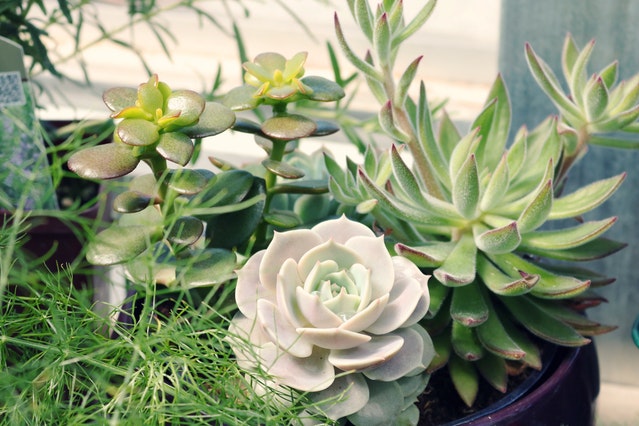People who are new to succulent growing may often follow the “commonsense wisdom of an experienced gardener“. This wisdom says: Compost is great for plants. You can plant them in it, and in some cases you can simply use it as a natural fertilizer, especially if you prepared the compost at home, and know exactly what you put inside. And while it certainly makes a lot of sense, and I am a big fan of learning from experience, you should realize that succulents are special plants. What works for other plant families, or other plants you grow at home, may not work for succulents. And that’s exactly the case with compost. Let me explain it.
Succulents are native to arid areas, deserts and semi-deserts of Africa, Arabian Peninsula, South America. If you’ve ever been to such places, and tested the quality of the soil, you for sure know there aren’t many nutrients inside. This isn’t the same soil you’d use for your vegetables or give to your trees in order to support their growth. Yet succulents thrive in it, with their glistening green leaves and colorful shiny flowers. They do so without any fertilizers or compost.
No compost is best compost for succulents
And here we come to a surprising answer to your question. The best compost for succulents is no compost. Save it for other plants in your house or garden, or save money for a more useful purpose–if you considered buying compost just for your succulents. These hardy plants to not need fertilizers or any soil rich in nutrients.
Just make sure to plant them in a soil mix intended for succulents, and place them on a sunny spot. If you water them with rainwater, and let the fallen leaves to slowly decompose in the pot, succulents will get all nutrients they need, and will thrive, without a need for any special interventions from your side.

Why compost can actually harm succulents
If you have a high-quality compost, but perhaps didn’t let it lie for long enough in the tank (in most climates compost needs at least two seasons to turn to soil and be ready to return to your garden), it can be too compact for succulents. Such a compost holds a lot of moisture, it stays in the soil. Succulents do not like to live in such an environment. Their roots will start to rot, they will lose their ability to transfer nutrients and water to the body of the plant, and the plant will eventually die.
Another thing that can happen with a high-quality compost super high in nutrients is that it will actually burn the roots of the succulent, simply because they aren’t accustomed to such a load of nutrients. Other plants would thrive and cherish in such soil, but succulents won’t. These plants prefer slow growth, without fertilizers. They just like to do things their own way, and perhaps they know what they are doing, since many succulents can live for centuries, and some actually never really die–unless you care for them badly, such as when you give them compost that they do not really need or want.
Exception always proves the rule
There are more than 10,000 different types of known succulents in the world. And for sure there are some we do not know yet, succulents that just wait for some explorer to discover them, and name them after someone dear to them, or themselves, which is often the case. And while most of these plants live in arid areas, some do not. Some succulents actually like humidity, and even richer soil content. We speak here about few species from the vast selection you can buy online or offline.
What I try to say here is that while as a rule of thumb you should not plant your succulents in compost, or fertilize them with it, in rare cases such a practice can actually make sense. That’s why you should always research about the succulent you bought. Learn about its preferences, and native living conditions–especially if it is a rare and expensive succulent, because for the most common succulents what I said is valid–they do not need compost and planting them in it will cause more harm then good. Hope this helps, and I wish you good luck with your plants!
May also interest you: How to make your own soil mix for succulents.
